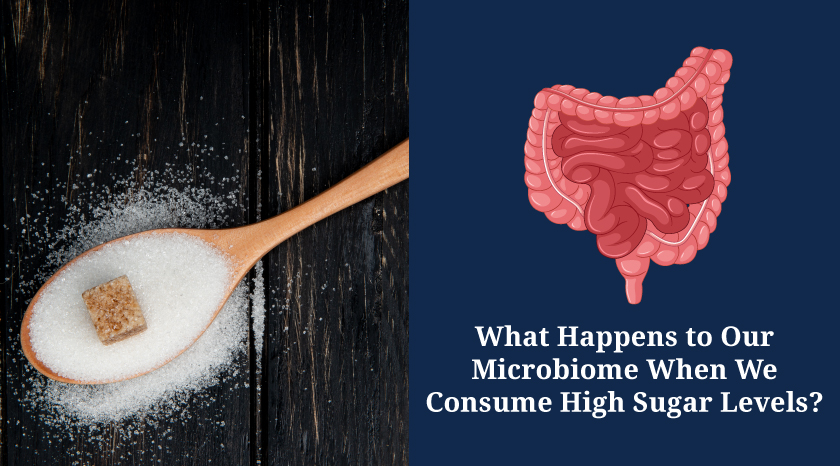In recent years, the gut microbiome has gained significant attention for its critical role in maintaining overall health. This complex community of microorganisms, including bacteria, viruses, fungi, and other microbes, resides primarily in our digestive tract and affects various bodily functions, from digestion and immune response to mental health. However, our diet, particularly high sugar intake, can profoundly impact this delicate ecosystem. Let’s explore what happens to our microbiome when we consume high levels of sugar.
The Gut Microbiome: An Overview
The gut microbiome is essential for digesting food, absorbing nutrients, producing vitamins, and protecting against harmful pathogens. A healthy microbiome is diverse and balanced, with a variety of beneficial bacteria that help maintain gut health. However, dietary choices, especially those high in sugar, can disrupt this balance, leading to negative health outcomes.
The Impact of High Sugar on the Microbiome
Alteration of Microbial Diversity
High sugar consumption can reduce the diversity of the gut microbiome. Beneficial bacteria, such as Bifidobacteria and Lactobacilli, thrive on fiber and complex carbohydrates, not simple sugars. When the diet is dominated by high sugar foods, these beneficial bacteria are outcompeted by less desirable microbes that feed on sugar, such as certain species of yeast and pathogenic bacteria. This reduction in microbial diversity can weaken the gut’s resilience and its ability to maintain overall health.
Promoting the Growth of Harmful Bacteria
Sugary diets can create an environment that encourages the growth of harmful bacteria and yeast, such as Candida. These microorganisms can cause infections and contribute to conditions like small intestinal bacterial overgrowth (SIBO). An overgrowth of harmful bacteria can also lead to increased gut permeability, commonly known as “leaky gut,” which allows toxins and partially digested food particles to enter the bloodstream, triggering inflammation and immune responses.
Increased Inflammation
High sugar intake is linked to increased levels of inflammation in the body. The overgrowth of harmful bacteria and the reduction of beneficial bacteria can trigger an inflammatory response in the gut lining. Chronic inflammation is a key factor in many diseases, including obesity, diabetes, cardiovascular diseases, and even some forms of cancer.
Negative Effects on Metabolism
The imbalance in the gut microbiome caused by high sugar consumption can affect metabolic processes. Beneficial bacteria play a role in regulating blood sugar levels and insulin sensitivity. When these bacteria are diminished, it can lead to insulin resistance, a precursor to type 2 diabetes. Furthermore, the altered gut microbiome can affect appetite regulation and fat storage, contributing to weight gain and obesity.
Impact on Mental Health
The gut-brain axis is the communication pathway between the gut and the brain. A healthy gut microbiome produces neurotransmitters like serotonin and dopamine, which regulate mood and cognitive function. High sugar diets can disrupt this balance, leading to mental health issues such as anxiety and depression. Research suggests that a diet high in sugar can impair brain function and contribute to mood disorders by negatively affecting the gut microbiome.
Steps to Protect Your Microbiome
Given the adverse effects of high sugar consumption on the microbiome, it’s crucial to adopt dietary and lifestyle habits that support a healthy gut. Here are some strategies:
Reduce Sugar Intake
Cutting back on sugary foods and beverages is the first step. Focus on natural sources of sweetness, such as fruits, and avoid added sugars in processed foods. Reading labels can help you identify hidden sugars in your diet.
Increase Fiber Intake
A diet rich in fiber supports the growth of beneficial bacteria. Include plenty of vegetables, fruits, whole grains, nuts, and seeds in your diet. Fiber acts as a prebiotic, providing nourishment for good bacteria to thrive.
Incorporate Probiotics
Probiotic-rich foods, such as yogurt, kefir, sauerkraut, and kimchi, can help replenish beneficial bacteria in the gut. Probiotic supplements can also be beneficial, especially after taking antibiotics or during periods of high sugar consumption.
Manage Stress
Chronic stress can negatively impact the gut microbiome. Practice stress-reducing activities like meditation, yoga, exercise, and adequate sleep to support a healthy gut.
Stay Hydrated
Drinking plenty of water helps maintain the mucosal lining of the intestines and supports the growth of beneficial bacteria. Avoid sugary drinks, which can contribute to microbial imbalance.
High sugar consumption can significantly disrupt the gut microbiome, leading to reduced microbial diversity, increased growth of harmful bacteria, chronic inflammation, metabolic disturbances, and negative effects on mental health. By adopting a diet low in sugar and rich in fiber, probiotics, and other gut-friendly foods, you can protect and nurture your microbiome, ultimately supporting your overall health and well-being.




